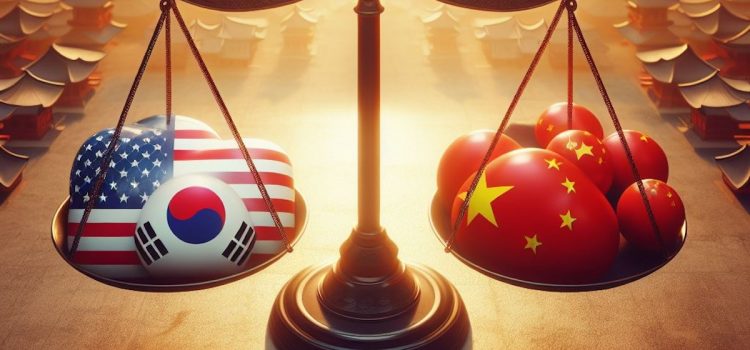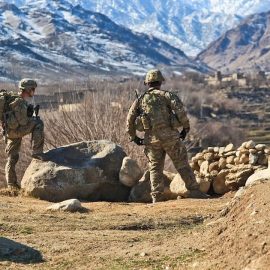

This article is an excerpt from the Shortform guide to "NPR News Now". Shortform has the world's best summaries and analyses of books, podcasts, and more.
Like this article? Sign up for a free trial here.
Where did the APEC meeting (2023) take place? What national leaders did President Biden meet with? What signal might this send to China?
President Biden’s recent meeting with Mexican President Andrés Manuel López Obrador in San Francisco holds significant implications for US-Mexico relations. The meeting coincided with the Asia Pacific Economic Cooperation Summit.
Continue reading for a summary of this podcast episode from NPR News Now.
APEC Meeting 2023
The episode discussed President Biden’s meeting with the Mexican president and other national leaders in the context of China’s growing influence.
US-Mexico Presidential Engagement in San Francisco
President Biden’s schedule included a significant meeting with Mexican President Andrés Manuel López Obrador in San Francisco. This engagement, which took place against the backdrop of the APEC meeting (2023), symbolizes a crucial moment in US-Mexico relations.
Asia Pacific Economic Cooperation Summit and US Strategy
Tamara Keith offered insights into the larger context of Biden’s rendezvous, viewing it as a strategic move to counterbalance China’s increasing influence in the region. The president’s coordination with leaders from Japan and South Korea further underscores the US’s concerted efforts within the framework of the economic dialogs of the APEC meeting.
Context
The APEC meeting (2023) convened leaders from 21 Pacific Rim economies to discuss economic cooperation and integration. US President Biden’s meeting with Mexican President López Obrador highlighted the importance of diplomacy in fostering economic partnerships and enhancing bilateral ties between the US and Mexico.
The APEC meeting underscored concerns about China’s rising influence in the Asia Pacific region. The US and its allies, including Japan, South Korea, and Mexico, actively work together to counterbalance China’s influence and promote stability through regional alliances and partnerships.
US-Mexico relations will continue to shape regional dynamics, extending beyond the economy to impact immigration policies and border security measures. As China’s influence grows, the strategies employed by the US and its allies will adapt to maintain a balance of power in line with their interests.
In conclusion, events like the APEC meeting (2023) foster economic cooperation in complex global politics. Leaders address common challenges, shape strategies against competing powers, and comprehend international relations at regional and global levels.
Learn more:
- Biden meets with Mexican president and closes out APEC summit
- FACT SHEET: Indo-Pacific Strategy of the United States
- How Should the U.S. Respond to China’s Influence in Latin America?
More Perspectives
The recent meeting between President Biden and Mexican President López Obrador has been portrayed as a crucial moment in US-Mexico relations, but caution is needed in assessing its significance. Without further information, it’s challenging to determine if the meeting represents a substantial shift or if it was routine and focused on specific issues.
The connection between the bilateral meeting and the APEC meeting (2023) is unclear, leaving room for skepticism regarding its direct relevance. Additionally, assuming that countering China’s influence was the primary motivation overlooks other potential factors at play in US-Mexico relations.
To better understand the implications of this diplomatic engagement, more evidence and context are needed. While there may be valid reasons to view this meeting as significant, it’s important to approach such claims critically and seek additional information before drawing definitive conclusions about its impact on US-Mexico relations and regional strategies.
Related Summaries
The Avoidable War by Kevin Rudd
Hostility between the US and China has been growing for over a decade, eroding the wary but pragmatic relationship of years past. Now, as tensions threaten to escalate, diplomat and politician Kevin Rudd argues that a full-blown military conflict can and should be averted.
The Silk Roads by Peter Frankopan
In The Silk Roads, historian Peter Frankopan identifies Central and Western Asia as the crossroads of human civilization, the birthplace of the world’s major religions, the battleground where the great empires of history rose and fell, and the garden from which today’s global economy first sprouted. He argues that understanding the East is crucial to our understanding of the world—particularly for Westerners who have lost this global perspective.

———End of Preview———
Like what you just read? Read the rest of the world's best guides to NPR News Now" at Shortform.
Here's what you'll find in our full NPR News Now episode summaries:
- Condensed news stories from a respected public media organization
- All of the day’s key events wrapped up succinctly
- Coverage of up-to-date news stories even when you’re short on time






